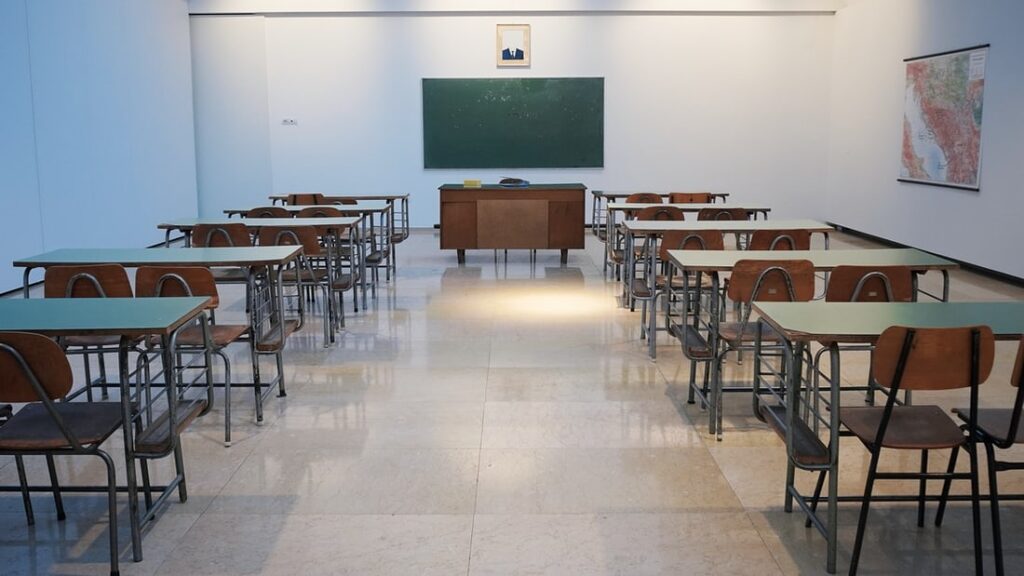We’re looking at both candidates’ positions on a range of key issues. Find out here what Gustavo Petro and Rodolfo Hernández have to say about education

Education, education, education. Tony Blair would have approved of both candidates in this race. It’s been a keystone touchpoint for years, and there’s broad agreement that education needs serious improvement. Unfortunately, most of the debate gets sidetracked onto university education, although primary, secondary and further education are also in dire need of resources. Colombia’s PISA results are appallingly bad, which Rodolfo acknowledges in his manifesto.
Read more: Your guide to the 2022 Colombian elections
Compulsory education: Petro’s and Rodolfo’s positions
For many Colombians, the rot in education starts in primary and secondary education. State services are notoriously underfunded and overcrowded. There are some excellent teachers, but they are few and far between as private schools poach a lot of talent. Petro wants to steadily increase coverage for state kindergarten, until all children are covered. Emphasis will be on the 2.7 million vulnerable children in the country. He also wants to target illiteracy, which he claims still excludes around a million (mostly older) Colombians. It’s worth noting that Colombia is at 95% literacy now.
Petro also promises to connect education to the cultures of the regions, although it’s not fully clear what that will mean in practice. The final two years at school will become springboards to further education in an attempt to quell desertion rates. Added to this is full connectivity, better food in schools, more infrastructure and more resources. It’s not clear how much all this will cost, where the money will come from, or how it will be evaluated. Rodolfo wants more money for rural schools and to target desertion rates above all. Other than that, he has little to say on obligatory education.
Teachers’ rights and work conditions are a key bone of contention, as it’s the best way to retain and attract talent. Rodolfo’s key aim with obligatory education is to push for quality levels to be increased. Interestingly, he wants to introduce qualitative assessment of teachers’ impact, rather than crude number-crunching. He also wants more formalisation of contracts and less prestación de servicios. There’s also a full reform of conditions, including better healthcare. All of this will be targeted at rural teachers first. Petro, as before, is offering more of everything. He will also include ethnoeducators in these reforms.
Petro and Rodolfo’s positions on university education
Onto the universities, then, and they both favour an expansion of university access, especially for children of families in lower strata and especially in public universities. Rodolfo wants more public universities, especially in the regions, while Petro would strengthen and finance the existing public universities as well as building new branches in the regions. Neither have much to say about private universities.
Rodolfo wants university management to be in the hands of academics, managed by professional administrators. He also wants universities to be moral centres with an academic focus at the same time as preparing students better for the world of work. It’s all a bit contradictory. Petro sees SENA, the largely vocational training organisation as a key alternative for teens leaving school and it will be included in his general amplification of public education. Rodolfo also supports apprenticeships for those that can’t make university, run by private companies.
The student loan body, ICETEX, is widely loathed and both candidates have major plans for reform. Petro unsurprisingly favours cancelling the outstanding debts and moving the organisation towards funding international scholarships. Rodolfo, for his part, will cancel debts progressively, with priority for the poorest: estrato 1 and 2. He will also prioritise those with high grades and students currently in term. His ICETEX would also focus on international study. It’s probably a sensible move by both men – ICETEX affects a lot of people and many of its debts will never be fully paid off anyway. Cancelling the debts now saves a problem further down the road (for some other president!) and will be very popular with many voters.
Looking at the two candidates, it’s clear to see that they both focus largely on tertiary education, and that both of them are in favour of public universities. Unfortunately, they both also lose focus with details and it’s not clear quite how any of these reforms will actually come about or be made to work. On paper, these are two sets of exciting and forward-thinking proposals with much to recommend. If nothing else, it’s heartening that both candidates are thinking about reform rather than streamlining, and key problems such as desertion are front and centre. Even if the victor can’t achieve all their aims, education is likely to see some significant improvements. The devil, however, will be in the details and you can forgive us for a little scepticism on how realistic all this is. Grade B+, good ideas but more coherence needed.





